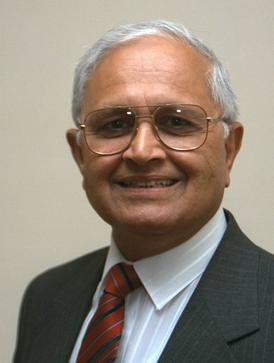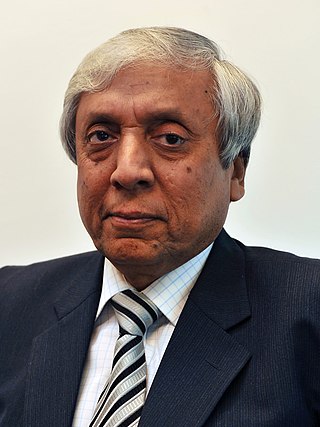
The Tata Memorial Hospital (TMH) situated in Parel, Mumbai, is a cancer institute. It is an autonomous institution under the administrative control of Department of Atomic Energy, Government of India. Its current Director is Dr. Sudeep Gupta.

Pakistan Atomic Energy Commission (PAEC) is a federally funded independent governmental agency, concerned with research and development of nuclear power, promotion of nuclear science, energy conservation and the peaceful use of nuclear technology.

Ishfaq Ahmad KhanSI, HI, NI, FPAS, was a Pakistani nuclear physicist, emeritus professor of high-energy physics at the National Centre for Physics, and former science advisor to the Government of Pakistan.

The National Oncologic Institute or ION is a specialized hospital for cancer treatment, located in Panama City, Panama. Between August 2000 and March 2001, patients receiving radiation treatment for prostate cancer and cancer of the cervix received lethal doses of radiation, resulting in eight fatalities.
The Chashma Nuclear Power Plant is a large commercial nuclear power plant located at Chashma in Mianwali, Punjab, Pakistan.
In Pakistan, nuclear power is provided by six commercial nuclear power plants with a net capacity of 3,262 megawatts (3.262 GW) from pressurized water reactors. In 2021, Pakistan's nuclear power plants produced a total of 15.3 terawatt-hours of electricity, which accounted for roughly 10% of the nation's total electric energy generation.

The Regional Cancer Centre (RCC) at Thiruvananthapuram is a cancer care hospital and research centre. RCC was established in 1981 by the Government of Kerala and the Government of India. It is located in the Thiruvananthapuram Medical College campus in Thiruvananthapuram, the capital city of the state of Kerala. It was established as an expansion of the Radiation Therapy / Radiotherapy department of Medical College Trivandrum. It is a tertiary care center for the managements of all types of cancers. The clinics are mainly on Haematology, Lymphoreticular, soft tissue, bone, head and neck, breast, CNS, gynaecological, urinary, chest, gastro, paediatric oncology and thyroid.
The Institute of Nuclear Medicine, Oncology and Radiotherapy is a cancer hospital located inside premises of Ayub Teaching Hospital Abbottabad, Khyber Pakhtunkhwa, Pakistan established in 2004. The facility is one of 18 cancer hospitals operated by the Pakistan Atomic Energy Commission or PAEC. The PAEC has made a priority to apply nuclear technology in order to improve Pakistan's health sector. INOR patients receive state-of-the-art diagnostic and treatment either free of charge or at subsidized rates and is also involved in the "National Cancer Awareness & Prevention Program".

Munir Ahmad Khan, NI, HI, FPAS, was a Pakistani nuclear engineer who is credited, among others, with being the "father of the atomic bomb program" of Pakistan for their leading role in developing their nation's nuclear weapons during the successive years after the war with India in 1971.

Ishrat Hussain Usmani NI, best known as I. H. Usmani, was a Pakistani atomic physicist, and later a public official who chaired the Pakistan Atomic Energy Commission (PAEC) from 1960 to 1971 as well as overseeing the establishment of the Space Research Commission.
Muhammad Masud Ahmad, best known as Masood Ahmad, was a Pakistani theoretical physicist and ICTP laureate known for his work in dual resonance and Veneziano model, a strings sting mathematically described the fundamental forces and forms of matter in quantum state.

Ansar Pervaiz, also spelled as, HI, is a Pakistani scientist and a nuclear engineer who was the former chairman of the Pakistan Atomic Energy Commission (PAEC), and former chairman of the Board of Governors of International Atomic Energy Agency (IAEA). Pervaiz is widely given credit for establishing the nuclear engineering, nuclear physics and nuclear technology institutes within Pakistan.
The history of pursuing nuclear medicine goes back to 1956, when the Pakistan Atomic Energy Commission (PAEC) was established under the executive order of the Prime Minister of Pakistan, Huseyn Shaheed Suhrawardy. The PAEC, the scientific body that is responsible for establishing the nuclear power plants in the country, has sat up a Nuclear Medicines laboratory. The PAEC also sat up the nuclear medicines lab and facilities throughout the country to fight against Cancer. Pakistan Atomic Energy Commission had provided the facilities of diagnosis and treatment of cancer and allied diseases to the patients from all over the country employing Nuclear Techniques at its Medical Centers. PAEC also sponsored the research program in the field of radiochemistry and biochemistry. PAEC also sat up the research institutes all over the country, some of them are below:
The Nuclear Institute for Agriculture and Biology, also known as NIAB, is a Pakistani agriculture and food irradiation national research institute managed by the Pakistan Atomic Energy Commission. It is located in Faisalabad, Punjab. Along with the Nuclear Institute for Food and Agriculture (NIFA), the NIAB reports directly to the Islamabad-based PAEC Biological Science Directorate. The current director is Dr. Muhammad Hamed.
The Institute of Radiotherapy and Nuclear Medicine is located at Khyber Medical College in Peshawar, Khyber Pakhtunkhwa, Pakistan. The facility is one of 18 cancer hospitals operated by the Pakistan Atomic Energy Commission or PAEC. The PAEC has made a priority to apply nuclear technology in order to improve Pakistan's health sector. IRNUM patients receive state-of-the-art diagnostic and treatment either free of charge or at subsidized rates and is also involved in the "National Cancer Awareness & Prevention Program".
The Karachi Institute of Radiotherapy and Nuclear Medicine (KIRAN) is a cancer hospital in Karachi, Pakistan under the administrative control of the Pakistan Atomic Energy Commission. KIRAN is one of nineteen medical centers in Pakistan providing patients access to diagnostic and treatment facilities either free of charge or at subsidized rates.
The Nuclear Medicine Oncology & Radiotherapy Institute Nawabshah, also referred to as the NORIN Cancer Hospital Nawabshah, is a healthcare facility in the Shaheed Benazirabad District, Sindh, Pakistan. It focuses on diagnosis, treatment, and research related to cancer, covering a population of about 3 million people across the Sindh province districts of Shaheed Benazirabad, Sanghar, Naushahro Feroze, Dadu and Matiari. This institute was formally inaugurated by Dr Azra Fazal Peechoho, Member of National Assembly, on 17th November 2012.
The Larkana Institute of Nuclear Medicine and Radiotherapy (LINAR), also known as LINAR Cancer Hospital Larkana, is a medical facility specializing in cancer treatment located in Larkana, Sindh. It is one of several research institutes established by the Pakistan Atomic Energy Commission (PAEC) across the country to combat cancer using nuclear medicine techniques.







